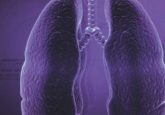Study highlights variation in treatment and survival for individuals with non-small-cell lung cancer
A new study published in the Journal of Thoracic Oncology evaluates the association between treatment trends and an individual’s overall survival (OS) with non-small-cell lung cancer (NSCLC). The current survival rate of patients diagnosed with advanced NSCLC is approximately 1–14% with a large proportion of individuals being untreated.
In this study, a team led by Elizabeth David (University of California, CA, USA) acquired case information of biopsy-proven NSCLC from the National Cancer Database. The researchers utilized propensity-matching to identify untreated individuals who were similar to patients that underwent standard treatment and to analyze the OS of treated versus untreated patients.
The data was further utilized to determine treatment trends over the study period, through linear regression analysis. The Kaplan-Meier method enabled the team to estimate the OS within each treatment group and the association of each variable on OS was analyzed by the multivariate cox proportional hazards model.
The researchers demonstrated that 21% of the patients received no treatment and for stage IIIA and IV the proportion of untreated patients increased by 0.21% and 0.40% respectively – over the study period (1998–2012). Their results highlight that untreated patients have a significantly shorter OS regardless of cancer stage.
In conclusion, propensity-matching of stage IIIA patients (6144 in total) demonstrated a higher survival rate in those treated with chemoradiation than those who received no treatment. The authors commented: “The OS of advanced stage patients receiving treatment is significantly better than patients not receiving treatment. Unfortunately, the proportion of untreated advanced stage patients is increasing.”
The authors concluded: Physicians should ensure that patients from disparate populations are evaluated and counseled thoroughly by multidisciplinary teams before choosing to forego treatment for NSCLC.”
Sources: David EA, Daly ME, Li C-S et al. Increasing rates of no treatment in advanced-stage non–small cell lung cancer patients: A propensity-matched analysis. J. Thorac. Oncol., doi: http://dx.doi.org/10.1016/j.jtho.2016.11.2221 (2017); www.eurekalert.org/pub_releases/2017-01/iaft-asn011817.php




